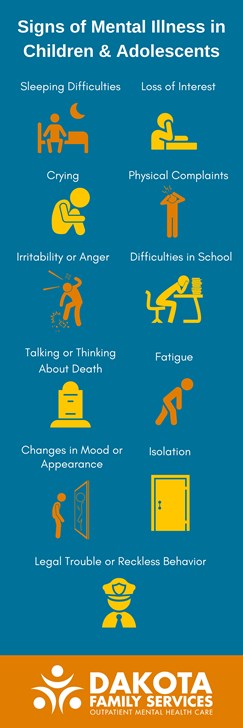Recognizing mental health issues in teens and children can be very difficult. Many times, kids suffer in silence, seek information from other places, or just deny that anything is wrong. Often, symptoms become too great to manage before children receive the help they need. This can lead to an increased risk of severe symptoms such as suicide, self-harm, or self-medicating with drugs or alcohol. It is often said in the mental health field that “early intervention is best;” but it can be very difficult to know the difference between a “normal” misbehavior or struggle, and an actual mental health issue.
Common Symptoms of Mental Illness in Youth

Signs to look for as a parent:
- Isolation: Discontinued time with friends, eating in bedroom,
- Sudden changes in appearances: Changes in makeup, clothes worn, or how they present themselves in general.
- Sudden shifts in mood: Mood changes are normal in teens, but if they are sudden, unexplained, or frequently changing, they could be a sign of something bigger.
- Increased irritability: Kids will often show signs of depression or anxiety through irritability. If irritability continues for a long period of time, it could indicate a bigger issue.
- Difficulties with sleeping: This includes trouble falling asleep, trouble staying asleep, or trouble waking up.
- Unexplained fatigue: Complaining of being tired or wanting to take a nap, despite having a full night’s rest.
- Difficulty in school: Grades, behaviors, loss of friends, etc.
- Legal trouble: Being brought home by police or getting criminal charges.
- Reckless/risky behavior: May include drugs, sex, spending, driving fast, jumping, or climbing on tall places.
- Somatic complaints: Stomach aches, headaches, needing to use the bathroom a lot more than usual, etc.
- Loss of interest in things they used to enjoy: Not partaking in sports or hobbies, or getting bored even when things are exciting.
- Talking or thinking about death: Does not necessarily just mean suicide.
- Crying: Child might be crying more than they normally do or with seemingly no trigger
- Increased anger: This may present as temper tantrums, aggression, or reporting a feeling of anger more often than usual.
What Should I Do If I Suspect My Child Has A Mental Health Condition?
Noticing these signs is only the first step. Once you notice there may be something going on with your child, have them seen by a professional. A mental health therapist, psychiatrist, or your primary doctor are good places to start. These professionals will assess what is going on and determine if your child’s symptoms are “normal” or not — and can recommend appropriate treatment or therapy if needed.
A parent’s “gut” is a strong sense. If you feel that something is going on with your child, you are probably correct.
Having continued conversations about mental health at an early age can help desensitize them to the subject of mental health. By doing this, you normalize the presence of mental health issues and make it easier for your children to share when something does not feel right. It is never too late to start having these conversations. Checking in on your children regularly is an effective way to make sure they are feeling well and to foster an environment where they are comfortable talking about how they feel.
It is not uncommon for children to say everything is okay, when it isn’t. Trust your gut. Many times, people with a mental health issue have a hard time noticing it in themselves until it becomes more severe.


